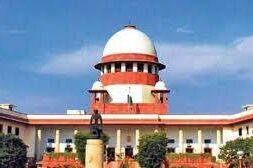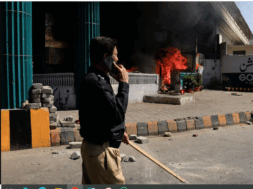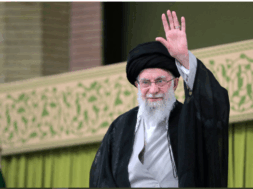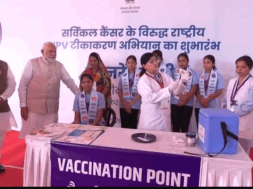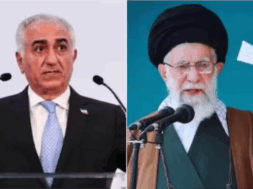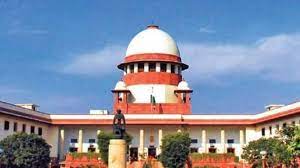
SC Disagrees with Centre: No Data to Prove Same Sex Marriage is Urban Elitist View
NEW DELHI, Apr 19: Same-sex marriages cannot be termed urban elitist concepts just because more people from cities are coming out of the closet, the Supreme Court said on Wednesday while continuing to hear the arguments seeking legal sanction for same sex marriages.
The Chief Justice of India DY Chandrachud observed there was no data from the government that “this (same-sex marriage) is urban or something.” The Centre, in its application earlier, had stated that what has been presented to the court on the subject by the petitioners is “a mere urban elitist view” and “the competent legislature will have to take into account broader views” of various sections.
The remark by the CJI was in response to the centre’s submission that the petitions seeking gay marriage rights don’t represent the views of the nation and that they reflect “urban elitist views”. The centre does not have any data to show that this is an urban elitist concept, he said.
Despite the SC clarifying on Tuesday that it was currently not going into the personal laws, the Centre on Wednesday told the bench that it has written to the Chief Secretaries of States, informing them that same sex marriage case was being heard by the Supreme Court.
The move to inform the States is despite the Supreme Court having already made it clear on Tuesday that it would not venture into the realm of personal laws of various religions. The court had decided to restrict itself to examining whether the ambit of the Special Marriage Act could be widened to accommodate same-sex marriages.
On Wednesday, Solicitor General Tushar Mehta handed over to the Bench copies of the Centre’s letters to the Chief Secretaries. Chandrachud, heading the five-judge Constitution Bench, without commenting any further, said it is “excellent” that the Centre has informed the States.
“State cannot discriminate against an individual on the basis of a characteristic over which the individual does not have control. When you see it as innate characteristics, then it counters (argument of) urban elitist concept… urban perhaps because more people are coming out of the closet. Government does not have any data also to show that same sex marriage is an urban elitist concept,” said the Chief Justice of India.
The centre is opposed to the Supreme Court hearing the matter and has contended that only the legislature can decide on the creation of a new social relationship.
“In the question of personal laws, the Legislature is duty bound to act in accordance with the popular will. Where the social consensus favours a particular definition of Marriage, the Legislature in giving sanction to that form is only discharging its duty of adhering to the will of the people. This unequivocal democratic will should not be negated by a judicial order,” it has said.
The centre has said that it would be relevant to “consider that what is presented before this Hon’ble Court is a mere urban elitist views for the purpose of social acceptance”. “The competent legislature will have to take into account broader views and voice of all rural, semi-rural and urban population, views of religious denominations keeping in mind personal laws as well as and customs governing the field of marriage together with its inevitable cascading effects on several other statutes,” it has said.
The bench, led by the Chief Justice of India, and comprising Justice SK Kaul, Justice Ravindra Bhat, Justice Hima Kohli and Justice PS Narasimha, is now hearing the petitioners’ arguments.
Appearing for the petitioners, Senior Advocate Mukul Rohatgi said the notion of heterosexuality must be deconstructed. He said fundamental rights guaranteed in Constitution were for all individuals, heterosexual or queer. So, there was no reason why they should be denied the right to marriage, he said. “We will not be treated as lesser mortals and there will be full enjoyment of right to life,” Rohatgi argued.
Earlier, walking the court through the provisions of the Special Marriage Act (SMA), which the petitioners are seeking to make gender-neutral, Rohatgi stated that it was outdated to say that only husband must pay alimony and maintenance after divorce.
Referring to Sections 36 and 37 of the SMA, which gives rights only to women over alimony and maintenance by husband, Rohatgi said, “Apart from anything else, so many years have gone by (since the law was made) that this could be otherwise unconstitutional today to say that only a husband will pay (maintenance) to the wife.” “Maintenance under the Hindu Marriage Act is either way. If the wife is earning much more, the wife will pay. This (provision under SMA) is unconstitutional today,” added Rohatgi.
Rohatgi also stated that the Court’s declaration recognising same-sex marriage will drive society to accept it, whether or not Parliament follows it up with a law.
Out of the 32 countries in the world that recognise gay marriage, at least 10 countries have recognised same-sex marriages by court rulings, whereas the remaining 22 countries allowed it through legislation, Human Rights Campaign, a US-based LGBTQ advocacy group said.
Earlier, reiterating its demand that States and Union Territories be heard before deciding petitions seeking legal recognition of same-sex marriages, the Centre has in a fresh affidavit informed the Supreme Court that it has begun a consultative process with states and UTs on the issue and urged the court to wait till the same is complete before going ahead with the case.
AM Singhvi highlighted another issue raised by the Centre that same-sex marriage was against cultural and traditional understanding of marriage. ‘Special Marriage Act was enacted as being agnostic to faith,’ he said. CJI Chandrachud, extending the argument, asked if Singhvi’s stand was that since the SMA was intended to be ‘agnostic to faith’, it would not be a ‘leap of faith’ to read it as now being ‘agnostic to sexual orientation’ as well.
An earlier version of the SMA was enacted in 1872. It was re-enacted in 1954 with provisions for divorce, etc. In 1952, when the Bill was proposed, the SMA was considered radical as it was the first law mandating monogamy in marriage. It was opposed by conservative parliamentarians for encouraging inter-faith and inter-caste marriages.
Justice Ravindra Bhat, on insurance, asks if any particular statute or the Insurance Regulatory and Development Authority prohibits insurance for LGBTQ persons. In response, Singhvi said individuals do not have a problem but for spouses, group or family insurance was not permissible. Senior advocate Menaka Guruswamy also responds: “It entirely depends on how the Court interprets marriage. The primary issue to open a joint bank account is that you have to be spouses.”
(Manas Dasgupta)
